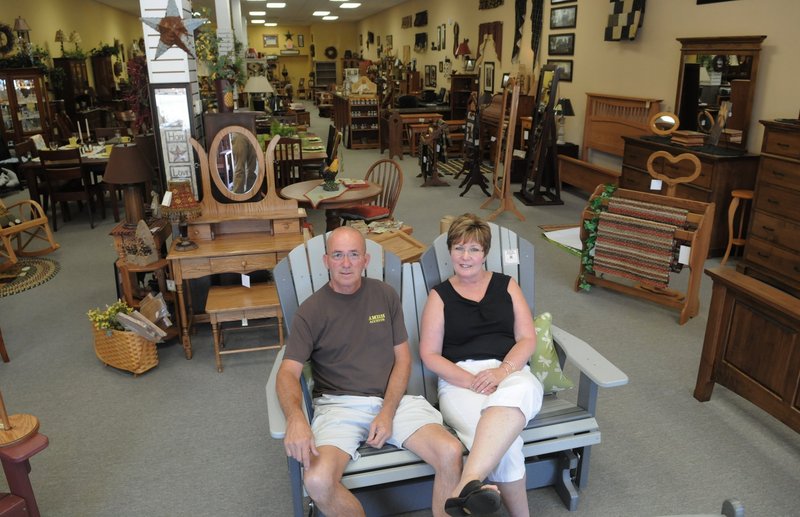PITTSBURGH – On Thursdays in Market Square, Joseph Zook peddles vegetables, breads and Mason jars full of jam from beneath the awning of a white tent. He has a thick beard, suspenders and square-cut blond hair that is just visible under the brim of his straw hat.
In and around Amish country, it’s easy to find countless stores and websites advertising Amish quilts, Amish candy and Amish crafts. But though Zook is Amish, it would be impossible to tell from the name of his Evansburg farm, Maple Run, or his products, whose homemade labels make no mention of their maker’s religion.
In fact, it’s a good bet that if the word “Amish” appears on a store or a product, the Amish themselves didn’t put it there. Experts and Amish alike say that the name, used as a marketing tool, is almost exclusively the domain of the non-Amish.
In the past few years, as the cultural presence of the Amish grows in mainstream America, the use of the word “Amish” in business names and marketing materials has become more common — and more lucrative. Some non-Amish who use the name are selling Amish-made products, but others have connections that are tenuous at best and some have no ties whatsoever to the Amish community.
That fact, Zook said, “just don’t seem right.” And it could also be against the law.
David Weaver-Zercher, a professor at Messiah College in Mechanicsburg who studies the Amish, said the trend of using the name to market products reflects a larger cultural movement. “In a difficult economy, people feel like the Amish have answers to things that are troubling us,” he said.
The name has become increasingly associated with good quality, simplicity and sustainability, Weaver-Zercher said, all attributes that businesses are eager to communicate to customers. “There’s a lot of things going on that make the Amish interesting and attractive, and that feed into the desire of creating an Amish brand.”
There is also quite a bit of money to be made. In Lancaster, the nation’s oldest Amish community, tourism brings in 11 million people and nearly $1.8 billion. Almost every hotel in the county, from the Olde Amish Inn to the Amish Country Travelodge, has tacked the word onto its name.
In 2010, Unker’s, a homeopathic pain relief ointment company based in Worland, Wyo., was looking for a new name after it lost a trademark dispute. Founder Jerry Doerr chose to rechristen his product “Amish Origins,” complete with a logo of a horse and buggy. Doerr’s company has no direct connection to the Amish, but he claims the ointment was originally developed by an Amish man.
As a result of the name change, said Doerr, “We have almost gone viral. Our Internet orders have tripled since we started using the Amish name.”
Heat Surge, a company based in North Canton, Ohio, picked up on the popularity of the Amish to market its space heaters. Ads that ran nationally in 2009 for the Roll-n-Glow “Amish fireplace” depicted craftsmen in suspenders who labored beneath the arched ceiling of a barn, electric heaters sitting on their rustic plank workbenches. Another ad showed a pair of heaters strapped on the back of a buggy driven by a couple in a straw hat and bonnet.
Heat Surge’s ads originally claimed the heaters were “an Amish man’s new miracle idea.” Later, it adjusted the marketing to admit what most people had suspected all along: The heaters were made in China (the product of an “engineering genius from the China coast”). Wooden mantels were the only part of the Roll-n-Glow Amish fireplace that was made by the Amish – in factories equipped with modern tools, not in barns, and delivered by truck, not buggies.
The company could not be reached for comment.
According to Doug Wood, a partner at Reed Smith’s New York office who specializes in law relating to advertising and media, companies marketing their products with the Amish name could have trouble under the federal Lanham Act, which prohibits false advertising. “If you want to buy a product because you think it’s related to the Amish and it’s not, the advertiser is misleading you,” Wood said.
Businesses often try to circumvent these regulations, Wood said, by using more vague terms, such as “Amish country” or, in the case of space heaters, “Amish-inspired.” Even that could be problematic, he said, given that the Amish faith rejects technology like the heater.
“You’re also trading on the goodwill of a group whose values are opposite those of what you’re trying to sell,” Wood said.
Consumers are not the only ones who suffer from misleading advertising around the Amish name. Many businesses, while not Amish-owned, deal directly with local Amish communities and their products, and they also stand to lose out.
According to estimates, more than half of the Amish population relies on small businesses, rather than farming, to make a living. Since many are reluctant to deal directly with non-Amish customers, advertise themselves and use tools like the Internet, third-party sellers can be necessary.
Mary Anne Winovich, who owns Amish Accents in Monroeville, said she has largely been successful because of the relationship she has with the Ohio Amish community whose furniture she sells. “They trust us,” she said.
On a recent hot July day in Market Square, Zook wore a long-sleeved green shirt beneath his suspenders. His daughter, Katie, sitting next to mounded loaves of Maple Run zucchini bread, had on a white bonnet and wore an apron over her dress.
Among the sellers in T-shirts and jeans, they cut a striking contrast. “We don’t have to use the word Amish,” Katie Zook said. “People can see us.”
Send questions/comments to the editors.


